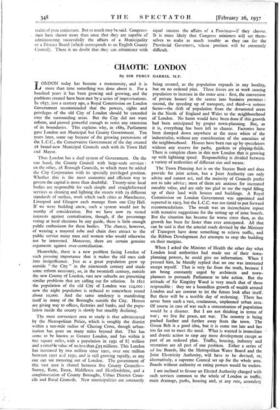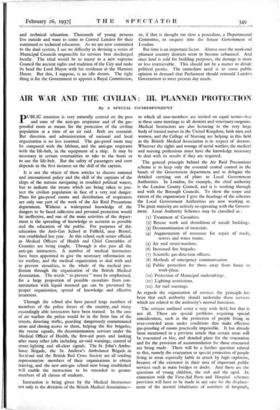CHAOTIC LONDON
By SIR PERCY HARRIS, M.P.
Thus London has a dual system of Government. On the one hand, the County Council with large-scale services : on the other, 28 Borough Councils, to which must be added the City Corporation with its specially privileged position. Whether this is the most economic and efficient way to govern the capital is more than doubtful. Twenty-nine local bodies are responsible for such simple and 'straightforward services as cleaning and lighting the streets with 29 different standards of surface, work which such cities as Manchester, Liverpool and Glasgow each manage from one City Hall. If we were building anew, such a system would not be worthy of consideration. But we have now 29 vested interests against centralisation, though, if the percentage voting at local elections be any guide, there is little enough public enthusiasm for these bodies. The chance, however, of wearing a mayoral robe and chain does attract to the public service many men and women who would otherwise not be interested. Moreover, there are certain genuine arguments against over-centralisation.
Meanwhile, there is a new problem facing London of such pressing importance that it makes the old ones sink into insignificance. Just as a great population grew up outside " the City " in the nineteenth century and made some reform necessary, so, in the twentieth century, outside the new County of London, vast new suburbs are presenting similar problems that are calling out for solution. In 1821 the population of the old City of London was 124,000 : now the night population is reduced to somewhere round about ropoo. And the same tendency is manifesting itself in many of the Boroughs outside the City. Houses are giving way to offices, factories and banks, and the popu- lation inside the county is slowly but steadily declining.
The most convenient area CO study is that administered by the Metropolitan Police, which is roughly the district within a ten-mile radius of Charing Cross, though urban- isation has gone on many miles beyond that. This has come to be known as Greater London, and has within it 692 square miles, with a population in 1931 of 81 million and a rateable value of no less than £93 millions. This London has increased by_ two million since 1901, over one million between 1921 aad 1931, and is still growing rapidly, as any one can see motoring out of London. The government of this vast area is shared between five County Councils— Surrey, Kent, Essex, Middlesex and Hertfordshire, and a conglomeration of County Boroughs, Urban -District Coun- cils and Rural Councils. New municipalities are constantly being created, as the population expands in any locality, but on no ordered plan. Three forces are at work causing population to increase in the outer area : first, the conversion of private housei in the centre into business premises : second, the speeding up of transport, and third—a serious factor—the drift .of population from the devastated areas in the North of England and Wales to the neighbourhood of London. No harm would have been done if this growth had been anticipated by proper town-planning. But, as it is, everything has been left to chance. Factories have been dumped down anywhere at the mere whim of the 'industrialist, without any consideration of the amenities of the neighbOurhood. Houses have been run up by speculators without any reserve for parks, gardens or playing-fields.
There is complete chaos in this new London that is growing up with lightning speed. Responsibility is divided between a variety of authorities of different size and means.
The Town Planning Act is on the Statute Book and does provide for joint action, but a Joint Authority can only advise and cannot act, and the majority of Councils prefer not to take advice; most of them are anxious for increased rateable value, and are only too glad to see the. rapid filling up of their land with houses and buildings. A Royal Commission on London Government was appointed and reported in 1923, but the L.C.C. was too timid to put forward recommendations. The result was an inconclusive report with tentative suggestions for the setting up of joint boards. But the situation has become far worse since then, as the growth has been far faster than ever anticipated. All that can be said is that the arterial roads devised by the Ministry of Transport have done something to relieve traffic, and the Ribbon Development Act attempts to stop the building on their margins.
When I asked the Minister of Health the other day what London local authorities had made use of their town- planning powers, he could give .no information: When I pressed him, he blandly replied that no one was interested except myself. That is very far from the truth, because I am being constantly urged by architects and town- planners to persuade Parliament to take action. But the attitude of Sir Kingsley Wood is very much that of those responsible : they see a boundless growth of wealth arotind London and are content to let the future look after itself. But there will be a terrible day of reckoning. There has never been such a vast, continuous, unplanned urban area. Of course in case of war such a concentration of population would be a disaster. But I am not thinking in terms of war ; we live for peace, not war. The country is being pushed further and further away from the town.: The Green Belt is .a good idea, but it is come too late and- lies too far out to meet the need. What -is wanted is immediate and drastic action to stop any more development except as part of an ordered plan. Traffic, housing, industry and recreation are all part of one problem. Either .a series of ad hoc Boards, like the Metropolitan Water Board and the Joint Electricity Authority, will have- to be devised, or, alternatively, a supreme Council set up -for the whole area. Boards without authority or rating powers would be useless.
I am inclined to favour an Elected Authority charged with such services common to the whole of London as traffic, main drainage, parks, housing and, at any rate, secondary - and technical education.. Thousands of young persons • live outside and want to come to Central London for their continued or technical education. As we are now committed to the dual system, I see no difficulty in devising a series of Municipal Councils responsible for services best discharged locally. The ideal would be to marry to a new supreme Council the ancient rights and tradition of the City and make its head the Lord Mayor with his residence at the Mansion House. But this, I suppose, is an idle dream. The right thing is for the Government to appoint a Royal Commission, or, if that is thought too slow a procedure, a Departmental Committee, to enquire into the. future Government of -London. • But time is an important factor. Almost over the week-end pleasant country districts seem to become urbanised. And once land is sold for building purposes, the damage is more or less irretrievable. This should not be a matter to divide political parties. The immediate need is to rouse public opinion to demand that Parliament should remould London Government to meet present day needs.



















































 Previous page
Previous page